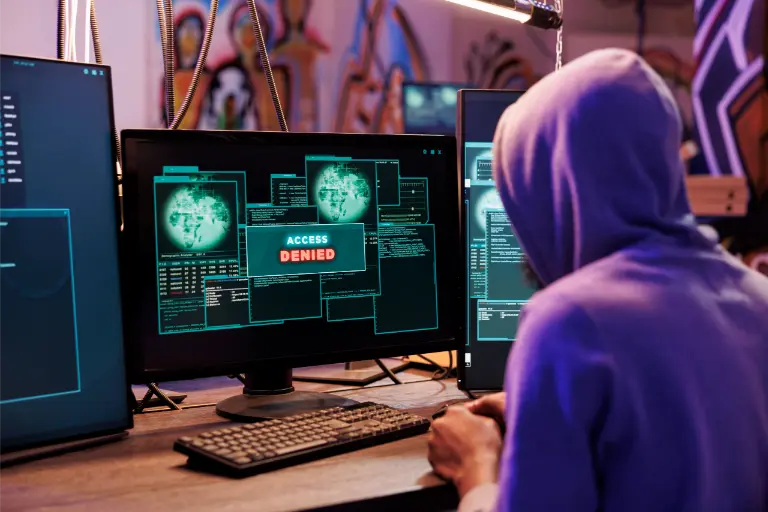Is Cybersecurity Hard? NTI Explains the Challenges and Solutions
When you think of cybersecurity, it’s easy to associate it strictly with IT departments and technical jargon. However, the field encompasses much more than just the nuts and bolts of computer networks. Cybersecurity is a multifaceted discipline that combines technology, policy, and human behavior to protect sensitive information from cyber threats. It requires a comprehensive understanding of how systems work, the vulnerabilities they face, and the implications of security breaches on organizations and individuals alike.
Cybersecurity involves a broad range of activities, from risk assessment and management to the implementation of security protocols and incident response. As you delve deeper into this field, you will discover that it is not just about preventing unauthorized access; it’s also about creating a culture of security within organizations and educating users about potential risks. This holistic approach is essential for effectively safeguarding digital assets.
In a world where digital transformation is at the forefront of business strategies, understanding the importance of cybersecurity becomes imperative. As you explore this domain, you will uncover the significance of developing a proactive mindset that anticipates and mitigates risks before they escalate into serious threats. This proactive approach is what makes cybersecurity both challenging and rewarding.
The Evolving Landscape Of Cyber Threats
The digital landscape is constantly changing, which means that cyber threats are continually evolving. As technology advances, so do the methods employed by cybercriminals. From sophisticated phishing attacks to ransomware and advanced persistent threats, the variety of risks you face is vast. Staying ahead of these threats requires vigilance, adaptability, and a keen understanding of the latest trends in cybersecurity. Recent statistics indicate that cybercrime is on the rise, with billions of dollars lost each year due to data breaches and other cyber incidents. The increasing interconnectedness of devices, often referred to as the Internet of Things (IoT), further complicates the landscape. As more devices become connected to the internet, the potential attack surface expands, making it easier for malicious actors to exploit vulnerabilities. The digital landscape is constantly evolving, and so are cyber threats. From ransomware attacks to sophisticated phishing schemes, businesses today face an unprecedented level of risk. With cybercrime costing companies billions of dollars annually, staying ahead of these threats requires a proactive, expertly managed security strategy. At NTI, we provide comprehensive managed IT services that include real-time threat monitoring, advanced VoIP security, and enterprise-grade cybersecurity solutions designed to keep your business protected. Our team stays ahead of the latest threats, so you don’t have to, ensuring that your systems, data, and communications remain secure. Don’t wait for a security breach to take action! Let NTI’s cybersecurity specialists fortify your business against modern cyber threats. Contact us today for a risk assessment and learn how we can enhance your security posture.What Are The Skills Required For A Career In Cybersecurity
If you are considering a career in cybersecurity, it’s crucial to be aware of the diverse skill set required to thrive in this field. While technical knowledge is vital, other competencies play a significant role in your success. Here are some key skills that you should focus on developing:
Technical Proficiency:
Familiarity with networking, operating systems, and coding languages is foundational. Understanding how systems interact and where vulnerabilities may exist is essential for identifying and mitigating risks.
Analytical Thinking:
Cybersecurity professionals must be able to analyze complex data and identify patterns. This skill enables you to assess potential threats and determine the best course of action to address them.
Communication Skills:
Being able to communicate effectively with both technical and non-technical stakeholders is crucial. You will often need to explain security concepts and risks to individuals who may not have a technical background.
Problem-Solving Abilities:
Cyber threats are often unpredictable, requiring quick thinking and creativity to devise effective solutions. Cultivating a proactive and adaptable mindset will serve you well in this dynamic field.
Attention to Detail:
In cybersecurity, even the smallest oversight can lead to significant vulnerabilities. Being meticulous in your work can help you identify issues before they become major problems.
By honing these skills, you will be better prepared to tackle the challenges of the cybersecurity landscape. Continuous education and hands-on experience will further enhance your capabilities in this evolving field.
Common Challenges In Cybersecurity
At NTI, we understand that maintaining strong cybersecurity practices can be overwhelming for businesses. With new threats emerging daily, evolving compliance regulations, and the constant risk of human error, organizations struggle to keep their networks secure. Many companies lack the in-house expertise to manage complex IT infrastructures while also defending against cyberattacks.
Additionally, balancing cost-effective security solutions with the need for robust protection can be challenging, leaving many businesses vulnerable to data breaches, downtime, and financial loss. Here are some common challenges you might face:
Rapid Technological Changes:
The pace at which technology evolves can be overwhelming. Keeping up with the latest tools, techniques, and threats is essential, and requires a commitment to continuous learning.
Skill Shortages:
The demand for skilled cybersecurity professionals far exceeds the supply, resulting in a competitive job market. This shortage can make it challenging to find qualified candidates for roles.
Complex Regulatory Environment:
Understanding and complying with various regulations, such as GDPR or HIPAA, can be complex. Navigating these legal frameworks requires a solid grasp of both technology and law.
Human Element:
Cybersecurity is not just a technical challenge; it also involves human behavior. Employees can inadvertently create vulnerabilities by falling victim to phishing schemes or neglecting security protocols. Addressing this human factor requires effective training and awareness programs.

Overcoming Cybersecurity Challenges With NTI’s Expertise
Cybersecurity presents unique challenges, from rapid technological advancements to a shortage of skilled professionals and complex regulatory requirements. Businesses often struggle to keep up with evolving security threats while also managing operations efficiently.
NTI eliminates these challenges for you. Our fully managed IT and security services ensure that your business remains compliant, protected, and ahead of cybercriminals. We offer customized VoIP security solutions, mass notification systems, and proactive IT management that take the guesswork out of cybersecurity, allowing you to focus on what matters—growing your business.
Struggling with cybersecurity complexity? NTI simplifies protection with turnkey security solutions tailored to your needs. Get in touch with our experts today and experience hassle-free cybersecurity management!
The Human Factor: Why Cybersecurity Isn’t Just About Technology
While technology plays a vital role in cybersecurity, the human element cannot be overlooked. Cybersecurity is as much about people as it is about systems and tools. Understanding human behavior and its impact on security is critical for developing effective strategies to mitigate risks. Here’s why the human factor is so important:
User Awareness:
Employees are often the first line of defense against cyber threats. Educating users about potential risks, such as phishing scams or social engineering attacks, can significantly reduce vulnerabilities within an organization. Regular training sessions and awareness campaigns are essential for fostering a security-conscious culture.
Behavioral Insights:
Understanding how people interact with technology can help identify potential weaknesses in security protocols. By analyzing user behavior, organizations can tailor security measures to better suit the needs and habits of their employees, reducing the likelihood of accidental breaches.
Incident Response:
In the event of a cyber incident, effective communication and collaboration among team members are crucial. The ability to work together as a cohesive unit can make a significant difference in how quickly and effectively an organization responds to a threat.
Crisis Management:
Cybersecurity incidents can cause significant stress and disruption. Developing strong leadership and crisis management skills within a team can help navigate these challenges and minimize the impact of a breach.
Recognizing the importance of the human factor in cybersecurity will not only enhance your understanding of the field but also empower you to develop more comprehensive and effective security strategies.
Future Trends: How AI And Machine Learning Are Reshaping Cybersecurity
As technology continues to evolve, artificial intelligence (AI) and machine learning (ML) are playing an increasingly prominent role in cybersecurity. These advancements have the potential to revolutionize how organizations approach security, providing new tools and strategies to combat cyber threats. Here are some key trends to watch:
Automated Threat Detection:
AI and ML algorithms can analyze vast amounts of data to identify patterns and anomalies that may indicate a security breach. This automation allows for faster detection and response times, reducing the window of opportunity for cybercriminals.
Predictive Analytics:
By leveraging historical data, AI can help organizations predict potential threats and vulnerabilities. This proactive approach enables security teams to address risks before they escalate into serious incidents.
Enhanced User Behavior Analytics:
AI-driven tools can monitor user behavior in real time, identifying unusual activities that may signal a security breach. This allows organizations to respond quickly and effectively to potential threats.
Adaptive Security Measures:
As cyber threats evolve, AI and ML can help organizations continuously adapt their security protocols. This flexibility ensures that security measures remain effective in the face of new challenges.
By staying informed about these trends, you can position yourself at the forefront of the cybersecurity field. Embracing AI and machine learning will not only enhance your skill set but also prepare you for the future of cybersecurity.
Partner With NTI For Superior Cybersecurity Solutions!
While cybersecurity may seem complex, the right strategy, tools, and expert guidance make all the difference. Staying ahead of cyber threats requires a proactive approach, continuous learning, and the support of trusted industry professionals.
At NTI, we specialize in providing cutting-edge VoIP solutions, business telephony systems, managed IT services, and mass notification systems to help businesses fortify their security infrastructure. Whether you’re looking to enhance your network protection, safeguard sensitive communications, or ensure seamless IT operations, our team of experts is here to guide you every step of the way.
Secure your business with NTI today! Contact us for a free consultation and discover how our tailored cybersecurity and IT solutions can protect your company from evolving threats.







